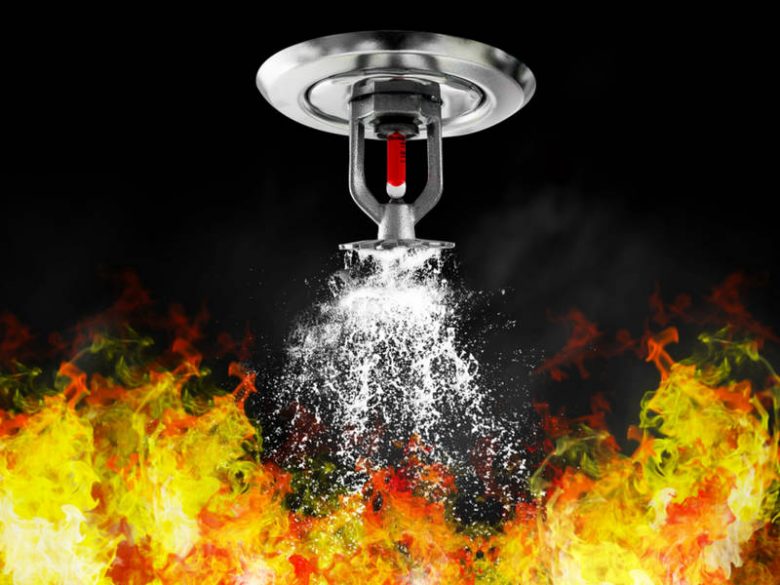Why Install a Fire Sprinkler?
There are many reasons to install a fire sprinkler. Fire sprinklers don’t just save lives they protect building and restrict damage to building contents. Moreover they enable more open plan building designs to meet regulations.
Sprinklers Protect Buildings
In the event of a fire a fire sprinklers will minimise the damage to a property.
Sprinkler heads activate individually. Fire sprinkler heads activate only over the area where the fire is. Unlike what you see in the movies, fire sprinklers do not all go off when a fire occurs in a home or office. Only the sprinkler heads closest to the fire will activate to spray water on the fire.
Sprinkler systems are activated by heat not smoke. They will not be activated by a smoking candle or toaster.
Many fire sprinklers activate within 30-60 seconds. This is much faster than it takes for firefighters to arrive to help put out a fire. Without the help of fire sprinklers, a fire can spread and grow while the firefighters are getting to the site and setting up their hoses. Fire sprinklers will contain and possibly even extinguish a fire while the fire service are on the way. The longer it takes to put out a fire the more damage is done to the property and its contents.
Fire sprinklers cause less water damage than a fire hose. Fire hoses discharge about 10 times more water per minute than fire sprinklers.
Some Buildings Require Fire Sprinklers by Law
Some building are required to have fire sprinklers. BS9251 is the British Standard covering fire sprinklers. Fitting sprinklers enables architects to design and build higher or more open plan buildings that are safe and comply with current fire regulations.
Save Life
Any property manager has a moral obligation to ensure the safety of a building’s occupants. Many groups of people are more vulnerable and at high risk of harm in the event of a fire. These groups include:
- Students and young people – From cooking to partying …. the risk of a fire starting in student accommodation is high. It can also be difficult to keep track of who is in the building or manage the evacuation.
- Elderly people – Older people can require extra time and often assistance to leave a building. They may also struggle to hear the alarm or become confused.
- Supported living and specialist housing often accommodates people with extra needs who can be at high risk from fire.
- Animals are often locked in buildings for security reasons, and in the event of a fire can not leave. Stables can be targeted by arsonists.
Reduce Financial & Sentimental Losses
Investments and possessions are at risk in a fire. Such as artwork or personal collections such as china, furniture etc. These could be priceless artefacts or of sentimental value. Fire can also cause significant disruption to personal or business activities. Fire sprinklers minimise the risk of such losses.
Increase The Value Of a Property
Properties with fire sprinklers fitted are more attractive to buyers. Naturally there is an upfront cost when you first have the system installed, but it will probably prove more than worth it when if you sell your property more easily and for a higher price.
Reduced Insurance Costs
Buildings and contents insurance premiums can be reduced by up to 15% when you have sprinklers installed in your property. Whether you’re a home owner, property manager or business owner saving each year on insurance adds up. In addition the risk of business interruption is reduces so saving may be possible in this type of insurance also.
Why Install a Fire Sprinkler? = Because they Minimise Fire Damage
The average area of fire damage in dwellings not fitted with sprinklers is 18-21m2; while in dwellings where sprinklers are present, the average area of fire damage is under 4m2 .
This is the findings of a report (Efficiency and effectiveness of Sprinkler Systems in the United Kingdom: An Analysis from Fire Service Data) This research included the detailed analysis of data on fires in premises in the UK in which sprinkler systems were fitted over the period 2011 to 2016. Data were provided by 47 Fire and Rescue Services. (Fire Statistics Table 0204, Fire Statistics Data Tables, Home Office)
In the data set there were 945 cases in which sprinklers were activated. The impact of the sprinkler system is known for 677 fires of these cases. Across all fires for which data were available, the sprinkler systems contained or controlled the fires in 62% of incidents and extinguished the fire in 37% of incidents. Hence, the performance effectiveness of sprinkler systems was 99% across all building types.
Please do not hesitate to contact us if you would like to talk to a sprinkler expert or arrange a survey to get a more accurate cost.







